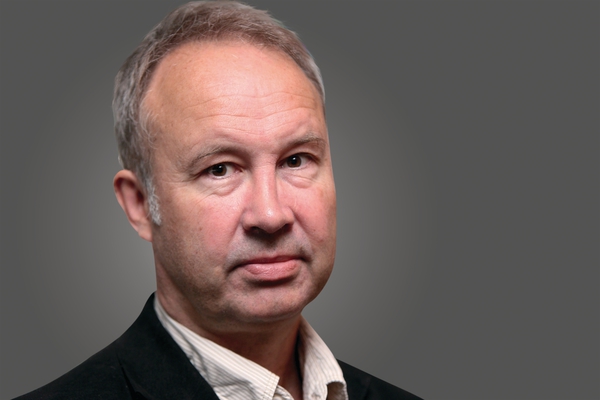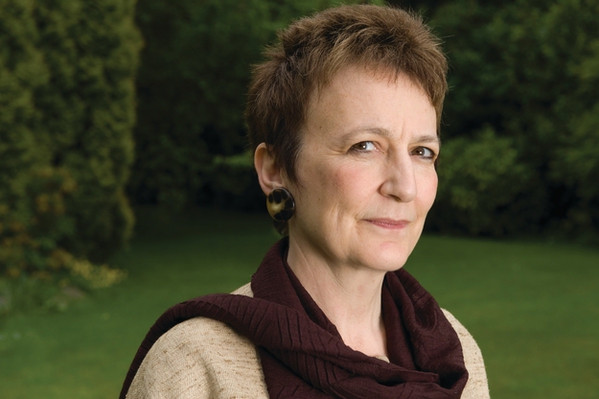You are viewing 1 of your 1 free articles
The Fink tank
Ahead of his appearance at the Chartered Institute of Housing’s annual conference, Conservative peer and Policy Exchange chair Danny Finkelstein tells Jess McCabe what he thinks about the welfare state
Danny Finkelstein bobs about Portcullis House in a pink shirt and suit trousers. He cuts a friendly, slightly bumbling figure, playing with his iPad case and fiddling with his security pass. He affectionately calls himself ‘Danny the Fink’.
The only outward clue that there’s more to the Conservative peer than meets the eye is the constant stream of politicians, lobbyists and senior journalists who frequently stop for a chat or wave hello during our interview. ‘The Fink’, more properly known as Baron Finkelstein of Pinner, is political and football columnist for The Times, chair of influential think tank Policy Exchange, a former advisor to William Hague and the close personal friend of George Osborne. He allegedly helps the chancellor write his speeches (or at least delivers some ‘good one liners’). Last year, The Spectator quoted an anonymous political insider as saying ‘what Danny writes today George thinks tomorrow’.
So a chance to find out what Lord Finkelstein thinks about housing is not to be passed up. But Inside Housing has managed to grab him a week before he is due to sally forth into a debate at the Chartered Institute of Housing’s conference in Manchester on a particularly heated topic: has the government abandoned the poor?
Lord Finkelstein doesn’t want to give away what he’s going to say when he goes up against left-wing journalist Owen Jones, but he is visibly bemused and audibly offended by any suggestion that government cuts are a result of a lapse of morality on the part of the Conservatives.
Welfare reform
‘I think that there is force in the argument that what we’ve gone through is very tough on people who don’t have very much money because they are most dependent on the state,’ he admits. But, taking the bedroom tax as an example, he says: ‘If you believe you’ve got to do something about housing benefit bills, what is the best, most compassionate, fairest way to do it? One way is to do it on the basis of number of bedrooms. You can come up with another method and it will have the same set of problems, unless you want to give everyone on housing benefit the same amount of housing benefit they get now. The way the last government dealt with it was to ignore the problem until we nearly went bankrupt.’
‘The disaster that’s happened to people that are not well off in this country is entirely a result of us having overspent and not growing enough,’ he adds.
Lord Finkelstein is chatty, prepossessing and funny (see box: ‘The Fink’ on…). He tells the story of following one man on Twitter after the man commented rudely on something David Cameron said. ‘It turned out he was a Nazi - not as in he had the wrong view on the bedroom tax and he’s a “Nazi”, as in somebody who wore swastikas,’ Lord Finkelstein says. ‘Social media is really interesting in that you encounter people who have jobs, go to work and are Nazis.’
He goes on to tell a story of his politics rooted in a concern for the ‘less well off’, the rule of law and ‘gentle liberties’. His proudest moment is the extension of marriage to gay couples, having championed gay rights since he was involved in the now-defunct Social Democrat Party in the 1980s. The Lord lays claim to helping transform the Conservatives into the sort of party that would support this legislation.
Parental influence
He says his biggest inspiration is his parents, who both came to the UK as refugees. His mother escaped the Nazis and Belsen, his father a Ukrainian prison camp. The family’s experiences in this country, however, have made Lord Finkelstein a sympathetic supporter of the welfare state - within moderation. ‘My children are in state schools, my wife works in the NHS, my father was a university professor and my mother was a teacher. My parents are immigrants. The reason I’m in the Conservative Party is my frustration at all my fellow concerned people to work out that we can’t pay for everybody’s desires all at the same time unless we work out how to do it,’ he says.
‘In fact, if you come from an immigrant family as we do, I don’t think you ever forget the contingent relationship you have with all the stability of living in a stable country,’ he explains. Such was the influence of his parents’ experiences that as a child he refused to break the law at all - not even copying records onto cassette tape for his friends.
Pro-build
And so, unsurprisingly, his solution to the crisis of affordability in housing is to build more homes, drive down the price of housing, and grow the economy. His views on the importance of building will no doubt go down well in the social housing sector. But his views on grant for social landlords, less so. ‘Obviously we have to have a subsidised housing system, and some people in the Conservative Party believe that there is in fact a need for socialised house building, but I’m less convinced by that,’ he says. Still, there may be room to influence Lord Finkelstein, as with a swipe of his lanyard, and a jovial smile, he adds: ‘But that’s where I get slightly out of my depth and I do need to study that.’
Don’t miss Danny Finkelstein at the CIH Housing 2014 conference. To book your place click here and don’t miss the event app.
‘The Fink’ on…
Who will win the World Cup:
‘No one knows who will win the World Cup - if they did, there’d be no point having the tournament. But there’s a 40 per cent chance that Brazil will win. It’s statistically true that they’re prohibitive favourites.’
Who will win the general election:
‘This is the most difficult election to estimate.
On one hand, the economy didn’t do very well. On the other hand, the last year of the parliament will probably see strong personal income growth and economic growth. I know Ed Miliband and I’ve always liked him.
I respect his intelligence and he’s reasonably politically imaginative. That is not the view of the public, Labour will struggle because of that. Without that difficulty, I would be reasonably confident that Labour will win.’







